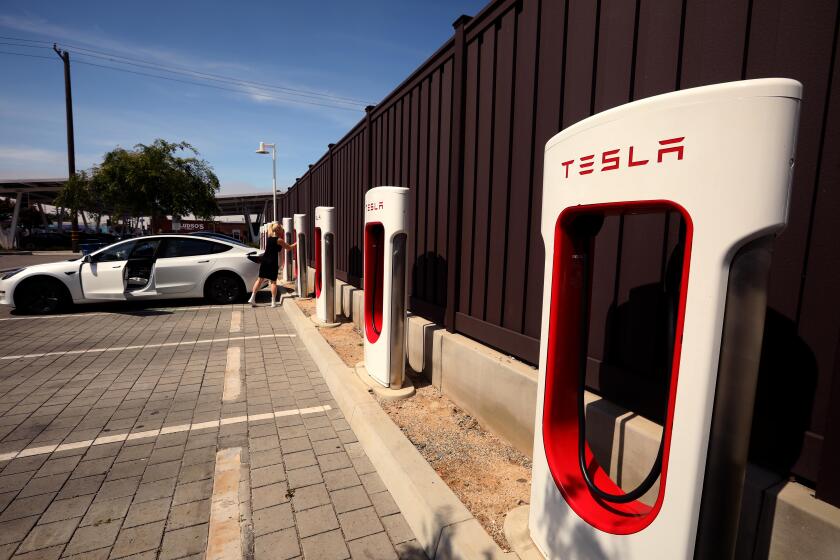Tighter Auto Fuel-Economy Rules Blocked in Senate : Congress: Effort to cut off debate on the gas-saving measure falls three votes short. The bill’s sponsor vows to try again during the next session.
A bid to impose dramatically more stringent fuel-economy regulations on the auto industry suffered a near-fatal setback Tuesday in the Senate, which barely 10 days ago gave the measure overwhelming support.
By a 57-42 margin, the Senate fell three votes shy of the 60% majority needed to close off debate on the measure and clear the way for a vote on final Senate passage. Until Tuesday, the final Senate vote had seemed assured, although the bill faced serious opposition in the House and the Bush Administration had threatened a veto.
Backers acknowledged that there now is virtually no chance the fuel-economy bill, introduced by Sen. Richard H. Bryan (D-Nev.) in an effort to reduce U.S. dependence on foreign oil, can be acted on until the next session of Congress.
“We lost this skirmish, and we’ll be back for another round in January,” Bryan said in an interview.
Bryan’s bill would have mandated a 20% increase in auto fuel economy above current “fleet average” levels by 1995 and a 40% improvement by the 2001 model year. The present fleet average standard is 27.5 miles per gallon.
The provisions were stripped from a separate clean air bill several months ago in return for a promise from congressional leaders for floor action before the end of the session. Interest in the legislation accelerated briefly after Iraq’s Aug. 2 invasion of Kuwait.
Bryan challenged Bush to come up with an energy policy that would save the 2.8 million barrels of oil that he said his bill would have saved by the end of the century. “The Administration rolled up the heavy artillery to defeat this,” he said. “They didn’t like our plan, but what is their plan?”
The end came after days of intense lobbying by the auto industry on one side and an array of environmental and alternate-fuel advocacy groups on the other. Supporters included the Sierra Club, which papered Capitol Hill and clogged fax machines all over Washington with appeals in favor of the legislation, which it said would limit emissions of “greenhouse gases” into the atmosphere.
Lamenting Tuesday’s narrow vote, Sierra Club activist Daniel Becker denounced Sen. Pete Wilson (R-Calif.) for failing to fulfill an earlier promise to help cut off debate. Wilson “instead was raising campaign money in California and allowed the auto makers and Saddam Hussein to win the day . . . while 100,000 soldiers are broiling in the desert to defend cheap oil,” Becker said.
Otto Bos, director of Wilson’s gubernatorial campaign, said that Wilson was a co-sponsor of the Bryan bill and still supports it. He said Wilson, who was campaigning in Southern California with Vice President Dan Quayle, “made it clear that he was on standby to return to Washington if his vote was needed. He was in close touch with his staff, and it was pretty clear it was going to be a three- or four-vote margin.”
The industry had argued that the bill would effectively mandate for U.S. auto manufacturers a fleet average of 35 miles per gallon by 1995 and 40 m.p.g. by 2001 and would foreclose the manufacture of profitable and salable larger cars.
The measure was also opposed by the Bush Administration, which had repeatedly threatened a veto. Transportation Secretary Samuel K. Skinner endorsed the industry argument, saying that a virtual mandate of smaller cars would sharply increase the fatality rate in traffic accidents as safer, heavier cars gradually would be forced from the nation’s highways.
Because Bryan’s bill would have required a percentage increase in fuel efficiency, rather than a flat mandate of miles-per-gallon targets, the domestic auto industry was joined by Japanese car makers and other foreign manufacturers. Because they already make more fuel-efficient cars, they would have to improve gas-consumption levels at a greater rate than their Detroit competitors, the foreign companies argued.
Under the previous fuel-efficiency regulations, foreign auto makers, especially the Japanese, had profited from fleet-average rules that struck hardest at the gas-guzzling heavy cars made in Detroit and opened an expanded market share to lighter, more efficient imports.
This time, it would be the fuel-efficient Hondas, Hyundais, VWs and Toyotas that would have to cut back gas-per-mile consumption even faster than the American auto makers.
That was little consolation to Detroit. Lobbyists representing the auto makers worked Capitol Hill corridors intensely, and auto industry union members sent thousands of telegrams to senators opposing the legislation.
The threat of a filibuster, especially effective in the waning days of a Congress facing elections this November, was orchestrated by Sen. Donald W. Riegle Jr. (D-Mich.), whose constituents stood to lose most if the bill passed.
Even if it had passed in the Senate, the bill faced potentially crippling end-of-session obstacles in the House, where normally it would have to be approved by the Energy and Commerce Committee. The panel’s chairman, Rep. John D. Dingell (D-Mich.), is a legendary guardian of Detroit’s mainstay industry.



